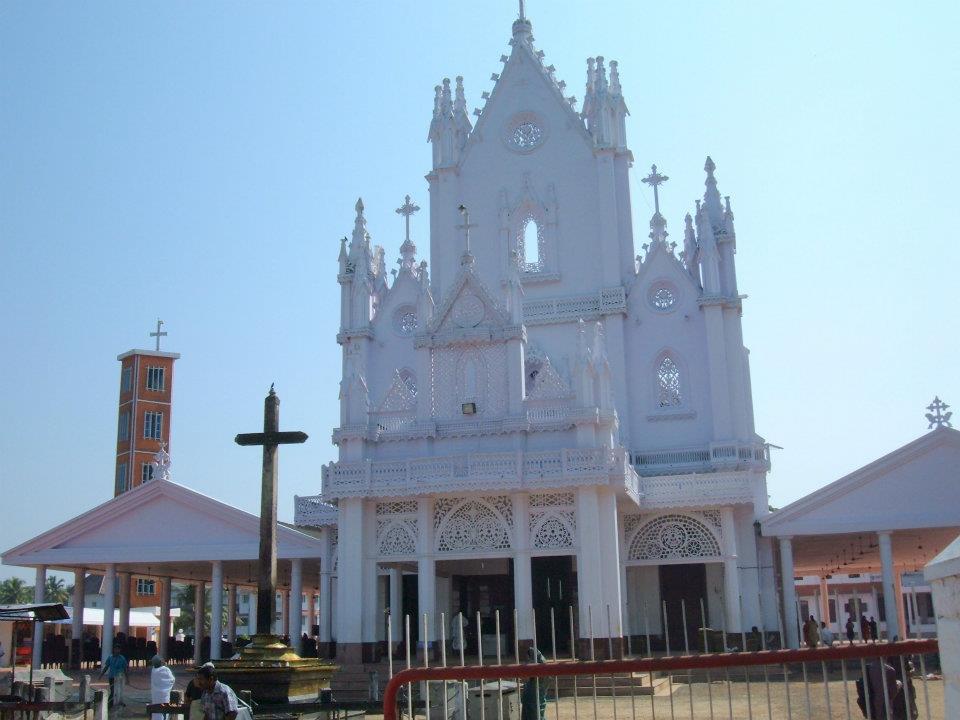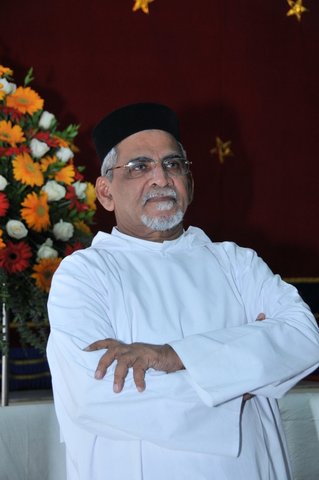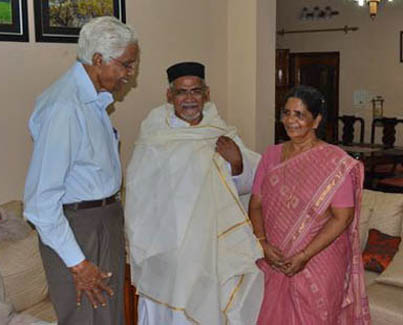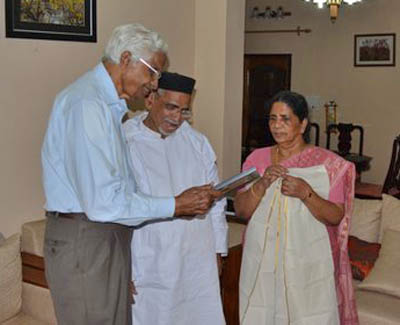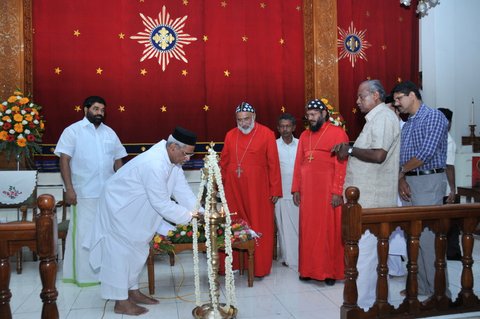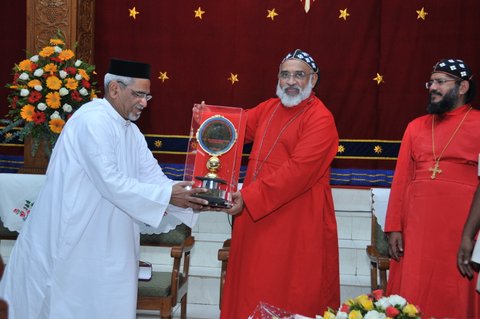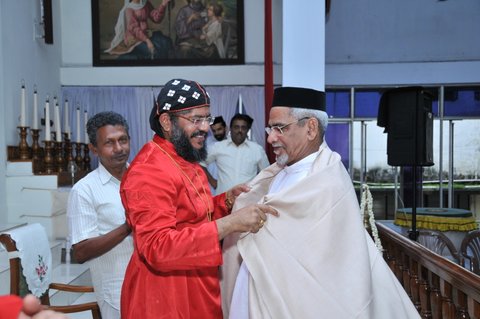
|
||
|
Malankara World Journal
Theme: Ordinary People .. Extra Ordinary Service
Featuring V. Rev. Kuriakose Kizhakkedathu Cor Episcopa Volume 4 No. 197 February 20, 2014
If the Journal is not displayed properly, please click on the link below (or copy and paste) to read from web
http://www.MalankaraWorld.com/Newsletter/MWJ_197.htm Archives: http://www.MalankaraWorld.com/Newsletter/Default.htm |
||
|
||
|
TABLE OF CONTENTS
|
||
|
If you are not receiving your own copy of
Malankara World by email, please add your name to our subscription list. It
is free. click here.
|
||
|
I. THIS WEEK: ANEEDE SUNDAY - REMEMBERING ALL THE DEPARTED FAITHFUL 1. Bible Readings for This Sunday (February 23)
2. Sermons for This Sunday (February 23)
3. Fresh Graves in the Churchyard
4.
Mor Jacob's Boovoosso - Prayer at Funeral Service
II. THEME: ORDINARY PEOPLE...EXTRAORDINARY SERVICE 5. Inspiration for Today: What it Really Means to Surrender Your Life
6. How Your Ordinary Life Can Make an Extraordinary Impact on the World
7. God Accepts You Just the Way You Are
8. Developing Nobodies in a Celebrity Culture
9. Trying to be Strong - Lean on God Instead
III. FEATURED: KURIAKOSE KIZHAKKEDATHU COR EPISCOPA, MANARCADU
13. Mangala Pathram
14. The Beautiful Hands of a Priest
|
||
Bible Readings For Aneede Sunday - Remembering All the Departed Faithful
|
||
|
This Week's Features
|
||
|
By Dr. Ray Pritchard Scripture: Acts 5:1-11
I still remember the first time I saw a dead person. It happened when I was in junior high school and a classmate suddenly died. It shook me up because I had been to his home and he had been to mine. We were just typical good friends. And then he died. The whole school was dismissed for the funeral. When I walked into the church sanctuary, I saw the open casket in front of the platform. I remember standing at the back of that crowded auditorium and seeing the outline of his face above the edge of the coffin. I was too scared to go up for a closer look. Years later I was touched by death again when my father died just as I was starting seminary. One night my mom called to say that Dad was sick. A little over two weeks later he died. No event has ever shaken my life like my father's death. It took me a long time come to grips with the fact that he was gone. We all have our own way of coping with death. Mostly we avoid the subject if we can. No one ever says, "Come over to the house this Friday night. We'll have pizza and talk about death." Death shocks us, scares us, and sobers us up. It forces us to confront the reality that someday we too will die. But sometimes we can't avoid it. Sudden Death Though the Bible is filled with stories about death, perhaps none is more shocking than the account we find in Acts 5:1-11. In the midst of the growth and blessing of the early church, we encounter sudden, unexplained, mysterious death. This is the story of Ananias and Sapphira. Perhaps it happened something like this . . . Sunday dawned bright and beautiful in Jerusalem. Throughout the city, merchants began uncovering their wares and mothers began to feed their children. For most people, that Sunday promised to be just another day. But for a certain group, Sunday was a special day they called the Lord's Day. For them, the highlight of the day was the meeting of the church. They didn't have their own building, just a borrowed room. And to that room on Sundays the believers came--happy, joyful, expectant. They came prepared to sing, pray, rejoice, and give. Yes, to give. Those early Christians specialized in giving. They not only gave money but clothes, food, tools, and the title deed to property. Sometimes they sold their land and brought the money to the church. As the morning sun rose in the sky, the believers made their way to the meeting. Among their number was a man called Ananias. He, like the others, brought his offering with him. I imagine it went something like this: Peter stood up and said, "Now if anyone has an offering, let him come forward." Ananias shuffled up to the front and said, "I had some property outside the city, a beautiful little piece of pasture land. I sold it last week for $300. Here is the money." With that he took his leather coin bag, turned it upside down, and emptied the contents on the table. The coins tumbled out, clinking together on the hardwood top. He turns to go back to his seat, satisfied with himself and his gift. Sensing something is wrong, Peter speaks to him:
It was true. Ananias had indeed sold the land, but perhaps he sold it for $800, kept $500 for himself, and gave $300 to the church. He and his wife Sapphira had talked it over and decided that was the best thing to do. After all, they really needed the money, but they wanted to leave the impression that they had given the full amount. Ananias turns to say something but his face betrays him. His lip quivers, his face flushes, he opens his mouth but the words won't come out. Peter speaks again.
As he heard those words, Ananias doesn't know that he will be dead in a few seconds. He raises his arm to speak, when suddenly he falls to the ground with a moan. He is dead before he hits the floor. A dead man in the church service! It had never happened before. No one said a word. Then someone screamed, "He's dead!" A crowd gathers around the crumpled form on the floor. One of the men bends over and touches the warm body, the eyes wide open in the terror of sudden death, the face still flushed with shame. Ananias had gotten up in the morning happy and content. He had his wife, his home, and money to spend. He put his clothes on, got his money, and set off for church. When he arrived, he shook hands with the greeters and took his normal seat, three rows from the front. When they sang the Psalms, he sang along. When they prayed, he prayed. When the time came for the offering, he was the first in line. When he stood up to come forward with his money, he had less than a minute to live. Now he lay dead on the floor, struck down by the hand of God. After the initial shock wore off, Peter motioned for the young men to come forward. "Get him out of here." They covered his limp body with a rough woolen blanket. His feet stuck out from the end. Two of them went around by his head, each grabbing an arm. Two more went to the feet. Two went to the midsection. Slowly they lifted the corpse of Ananias off the floor. His head rolled from side to side, his hands dangled from limp arms. They dragged the body off as if it were a sack of heavy grain. Through the back door and down the stairs they labored with the body, now slipping, now stumbling, barely managing to make it outside. In the back of the building was a small plot of ground. They laid Ananias down and found a shovel. They dug a shallow grave, heaved the body into it, and covered it with a mound of dirt. Their mission accomplished, they turned and left without a backward glance. Beautiful Sapphira But the story is not over. It is still bright and hot, now the middle of the afternoon, about three hours later. The shock was so great that word has not spread very far. Sudden death. Now no one wants to leave the building. They stay and talk and wonder about it all. In walks Sapphira. Her name means "Beautiful," and evidently she was. They stared at her, thinking she would be wearing black, would be tear-stained, would be nearly hysterical. But no, she smiles, laughs, greets her friends. Suddenly, it dawns on all of them at once. She doesn't know! She hasn't heard! Before anyone can tell her, she walks up to greet Peter. The apostle looks her straight in the eye and asks the one question she doesn't want to hear. "Did you sell that land for $300?" She gasps, blinks her eyes, and looks away. A tinge of guilt plays on her conscience, but she manages to look at Peter and say, "Yes, that was the price." Like her late husband, she turns to go to her seat, but Peter stops her in her tracks. "Why have you agreed together to put the Spirit of the Lord to the test? Why have you told this lie? Look, Sapphira, look at the door. Do you see the feet of those young men? Those feet carried your husband out. Now they will carry you." For a tiny moment her face looks startled, then contorts into a grimace. She dropped to the floor with a gasping moan. Now pandemonium breaks loose. Women are screaming, children crying, people dashing for the exit. Two people dead in one day. It was scarcely 3:00 p.m. Peter turned and motioned with his arm to the young men. By now accustomed to their grisly task, they take another rough cloth and wrap it around the warm corpse. They carry Sapphira out the door, down the stairs, into the backyard. There they begin to dig another shallow grave, the hot Judean sun burning their backs as they hacked away at the hard brown clay. Sweat dripped from their foreheads, past their eyes, down their noses and dropped to the ground. Finally, the hole was deep enough. They buried Sapphira next to Ananias. Then they turned and walked away, hoping that no one else would die in church that day. Acts 5:11 tells what happened when word spread throughout Jerusalem: "Great fear came upon the whole church, and upon all who heard of these things."
That Sunday had dawned bright and clear and hopeful. That's the story. It is simple enough. Chilling, macabre, frightening. No Halloween tale can match this true account. If death scares us, then the story of Ananias and Sapphira stops us cold. Why Did They Die? That brings us to a crucial question that can be asked different ways:
Why did they die? It is easier to answer in the negative. First, they did not die simply because they told a lie. True, they did intentionally lie. They conspired together to deceive people. But it's not just the fact of the lie. If God routinely killed people for telling lies, then most of us wouldn't make it through another day. The undertakers would become overnight millionaires. Lying is a sin, and it is punished by God, but that's not the whole story here. Second, they did not die because they held back part of the money. True, they kept some of the money for themselves. But Peter makes it crystal clear that they had every right to do so. When the early Christians gave everything they had, they did it voluntarily. This is not a text to prove the dangers of not giving 100% of our money. If it were, then none of us would survive the offering next Sunday morning. There is something much deeper than that in this story. Something that touches very close to home, something that makes me look in the mirror and hold my life up for inspection. So why did they die? When Ananias and Sapphira brought their offering, they gave the impression that it represented 100% of the purchase price. Anyone watching would have said, "What wonderful Christians, they have given all they have." That's what they wanted people to think. Apparently they thought God would be fooled too. That was their great sin. That is why they died.
Here is a fact worth pondering. The sin of hypocrisy always starts on the inside. A hypocrite on the outside was a hypocrite on the inside first. That's what makes it so dangerous. It's not always easy to spot. The warning of Ananias and Sapphira is a warning for church members, not for the disinterested. It's a warning for insiders, not for outsiders. It's a warning for the saved, not for the lost. It's a warning for me and for you. The more religious you are, the easier it is to be like Ananias and Sapphira. I say that simply because Christianity involves both the inward and the outward. It's easy for us to go through the religious motions with little heart commitment. The distance between us and them may not be as big as we think. Not that I think we are likely to drop dead in church next Sunday. We might, but it doesn't happen very often. In thirty-five years of ministry, I've seen people get sick, pass out, and in one or two cases apparently have a heart attack, but I've never seen anyone drop dead in church.
It could happen, but it's not a common thing. Back Door Revival That leads me to my final point. On a first reading of the text, it seems fearful, as if God was sending a warning from heaven. And of course that's exactly the right response. If we can read this text and not be afraid, then we need to read it again . . . slowly. Remember that "great fear" came upon everyone who heard about this (Acts 5:11).
The whole church got scared. All the non-Christians who knew Ananias and Sapphira got scared when they heard about it. I remember a remark made by a friend who taught elementary school back in the day when you could spank the students. "Spank one boy," he said, "and 300 other kids sit up straight." Note what happens immediately after this double death in church:
1. No one wanted to join the Christians even though they were highly regarded
(v. 13). In other words, something like a revival broke out in Jerusalem. Once the shock wore off, people respected the Christians even more because they realized God was with them so eventually many more were saved and joined their number. William Arnot tells us what this really means:
We probably don't think of this as a miracle but Arnot is right. The "worthy object" to be attained is the purity and unity of the church. God cares so much about purity and unity that he will make an extreme example of Ananias and Sapphira so that the lesson would be tattooed on the soul of the early church. When G. Campbell Morgan wrote about this passage, he drew an important conclusion:
We used to talk about a "back door revival" where God cleansed the church by removing some people who didn't need to be there. That's exactly what happened to Ananias and Sapphira. Their sudden death was a kind of "severe mercy" from the Lord because it made the church stronger, caused more people to fear the Lord, increased respect in the community, and led to more people being saved and joining the company of believers.
That's how God builds his church.
God will be praised even in the death of hypocritical church members. So here are two lessons for us to ponder:
You can't fool God so don't even try. We can say this another way.
Don't be like Ananias and Sapphira. The words of William Cowper (writing in 1774) put this strange story in its proper perspective:
Many of us face what seems to be a "frowning providence" at this very moment. But the ways of God go far beyond our "feeble sense." What seemed to be disaster for the church in Jerusalem became a channel for much greater blessing. Sudden death led to fear that led to new respect that led to new interest in the gospel. Those fresh graves in the churchyard were the seeds of a harvest yet to come.
What a God we serve! Let God be God and all will be well. Copyright © 2014 Keep Believing Ministries, All rights reserved. |
||
|
[Editor's Note: This prayer, from the funeral service liturgy, tells us about our hope for the departed.] O Son of God, grant rest to your servant among the
O Lord, You are the resurrection and the life for those
Come down, O life-giving spirit, from the Father’s
O son of God, Who is the hope of all mortals, may this
Glory be to the father Who granted hope to the
Glory be to you, Who quickens the dead from their |
||
|
by Dr. Jack Graham
Over 200 years ago, a humble shoe cobbler by the name of William Carey stood before an austere group of ministers at a Baptist association in London, England. And he said to those men, "God has put it on my heart to reach the masses with the Gospel message and to take seriously the command of Christ to take the Gospel to the world." Well, one rather pompous minister stood to his feet and said to Carey, "Young man, sit down. When God chooses to save the pagan, He'll do it at His own time and in His own way." But that would not suffice for William Carey. Bold in his faith, he went to India, led countless people to Jesus Christ, and sparked the modern missions movement! All it took was one little shoe cobbler in England to change the world for Christ. And he did it despite the fact that many people, even Christians, were against Him going. What a bold testimony of faith! What would your life look like if you served God with that kind of fervor? Where would you go? What would you do? Take a bold step of faith today and tell God, "Wherever… whatever… whenever… I'm yours!" SURRENDER YOURSELF TO GOD TODAY BY FOLLOWING HIS CALLING ON YOUR LIFE… WHATEVER IT MAY BE! Source: Power Point Devotional [Editor's Note: We often think that we are too small or insignificant to do anything to make a difference in the world. However, bible is full of stories of how God has used ordinary people to do extraordinary things for him. Examples like Moses, David, Mary, Disciples of Jesus etc. all tell us how some obscure people did great things for God. This week, we want to feature how a humble priest, who is celebrating his Golden Jubilee of Pastoral Ministry, has changed the world around him. Please read on. ...] |
||
|
by Whitney Hopler, Crosswalk.com Contributing Writer There are so many problems in our fallen world that it's easy to feel as if one person's efforts can't do much to fix them. But God calls every believer to help solve the world's problems, and one ordinary person's life can actually make an extraordinary impact on the world. You can make the world a better place through your life, and you don't have to be in worldly positions of influence (such as Hollywood or Wall Street) to do so. When you rely on God to help you impact the world, His power will start to work through you in your neighborhood, workplace, and everywhere else you go – impacting the world around you significantly. Here's how your ordinary life can make an extraordinary impact on the world: Shift your focus from heroism to love. You don't have to be a superhero in order to make significant positive difference in the world; you simply need to bring love to people who need love. When you rely on God to help you reach out to others, God's love will flow through you into other people's lives in every situation. So instead of seeking only dramatic ways of trying to help people, simply make a habit of inviting God to work through you, and you'll make an extraordinary difference even in ordinary circumstances. Forget about following a set of rules or tactics. The most effective strategy for making a positive difference in the world isn't really a strategy at all. It's just a simple habit of encountering God's love, experiencing that love as you work in the world, and engaging others with that love – all of which you can do in any situation. Keep in mind that impacting the world for the better is much more about who you are than it is about what you do. Dance with God. Develop greater unity with God by staying in step with Him as if you and God are dancing through life together. Follow these three main dance steps: "God in me" (asking yourself: "How is God transforming me?"), "God ahead of me" (asking "What is God already doing in the world?") and "God through me" (asking "What does God want to do through my life?"). Seek God's guidance through prayer. Prayer is the key to both discovering how God wants you to do contribute to the world and gaining the power to do that work. Pray for God's perspective to see the needs around you, God's compassion to feel the pain that you see, God's love for people so that you'll consider them more important than yourself, God's power to do something about the needs around you, and the ability to hear God's voice so that you can act with wisdom. Discover your unique contribution. The way you can best make a difference in the world will line up with the unique way that God has made you as a person. You have something to offer the world that no one else can contribute. So ask God to help you figure out what you're most interested in doing, and what you do best. Then use that information to discern which opportunities to serve are best for you to act upon. Serve alongside others. Join your mission with other people who share similar missions, since you can have a greater impact on the world working together with others than you can alone. Ask God to show you what He wants to do through a group of people that includes you, such as a small group from your church or a team of volunteers for a specific charitable organization. Open your heart and mind to work together in unity with others who are different from you yet committed to working toward the same goals. Ask the Holy Spirit to help you forgive people who have hurt you, ask forgiveness when you've hurt others, and resolve conflicts so they don't harm your relationships. Create space in your life to make a difference in the world. Free up time, money, and emotional energy in your life so you'll be able to take on the service assignments that God brings your way. Eliminate activities from your schedule and expenses from your budget that consume your resources without adding significant value to your life. Be fully prepared to say "yes" to God whenever He calls you to give to others in need. Engage people with the "restful force" of Jesus. Just as Jesus' ministry work on Earth flowed well with people's real needs and God's power to meet those needs, your own ministry work can do the same. Don't force an agenda on people; instead, approach them restfully by asking them questions, listening to them, observing them, and paying attention to their needs. Then, rather than offering a prepackaged response, ask the Holy Spirit to guide you to respond in ways that best fit each situation. When you do, people will feel cared for rather than manipulated. Join God in His work among your neighbors and networks. Pay attention to what God is doing in the lives of the people you relate to regularly – from your family members, friends, and coworkers to people you know from local businesses and civic organizations. Consider what specific needs you notice among them and how God is already at work meeting those needs; then ask God to show you how He may want you to get involved in the process of helping them. Seek to meet three key needs. In every situation, follow the Holy Spirit's lead to give people hospitality, generosity, and forgiveness – all of which are vital needs that, when met, will inspire people to seek God more. Share the Gospel story naturally. Whenever people ask you why you're serving them, those are opportunities for you to share your faith in Jesus Christ by putting the Gospel story in your own words and discussing it naturally in conversations with them. Practice telling people a brief (two to four minutes long) story of how Jesus has impacted your own life, including: your life before knowing Jesus, how you encountered Jesus for the first time, and how Jesus has changed your life. Hearing your story can inspire others to begin their own relationships with Jesus, which is the best impact you can possibly have on them. Source: Adapted from Difference Makers: An Action Guide for Jesus Followers, copyright 2013 by M. Scott Boren. Published by Baker Books, an imprint of Baker Publishing Group, Grand Rapids, Mich., www.bakerbooks.com. About The Authors: M. Scott Boren is a trainer, consultant, and author of 'Missional Small Groups and The Relational Way.' Working with Allelon, he develops materials for the missional church. He shares life with his wife, Shawna, and their four children. Visit his website at: www.mscottboren.com. Whitney Hopler, who has served as a Crosswalk.com contributing writer for many years, is author of 'the new Christian novel Dream Factory', which is set during Hollywood's golden age. Visit her website at: whitneyhopler.naiwe.com. Source: crosswalk.com spiritual life |
||
|
By Michael Youssef, Ph.D. Do you ever find yourself absorbed in the activities of life and wonder how you became so busy? Many people overextend themselves to the point of exhaustion. When asked why they are rushing here and there, they answer that they are just keeping up with the normal details of life. As amazing as it may seem, it is not unusual to find people doing all kinds of unnecessary "work" in the church. Maybe they are trying to reach a level of acceptance in God's eyes or seeking to please another person. Striving to gain the approval of others is stressful at best. Trying to gain God's approval is useless. This is because God has already placed His stamp of approval on your life and nothing you do can cause Him to love you more than He does right now. When you accept Jesus Christ as your Savior, you gain everything there is to gain of God's love. Even before you were created in your mother's womb, God loved you fully and completely. This world has nothing of lasting value to offer us. All of our striving and rushing to gain approval results in only one thing: emptiness of heart and soul. Satan's greatest folly is to tempt us into believing that through our good works or our smart appearance someone will love us more. Nothing could be further from the truth. Don't allow the enemy to entice you into believing you are unacceptable. God accepts you just the way you are. All He longs for you to do is to love Him with a whole heart. When you truly understand your acceptance in Christ and experience the everlasting love of God, you will obey the Lord as an expression of your love. Prayer: Lord, thank You for loving me even when I act unlovable. Forgive me for the times when I turn away from You. I surrender my life to You. I pray in the name of Jesus. Amen. "I have loved you with an everlasting love; I have drawn you with loving-kindness" (Jeremiah 31:3). Source: "God's Stamp of Approval," My Devotional; © 2013 Leading The Way |
||
|
by Stephen Miller All throughout Scripture runs a common theme: The leaders of tomorrow are nobodies today.
Some are born into more privilege or with more natural talent than others, but no one is born an all-star. Many of us know well the feeling of being young, passionate and energized with a drive to minister and serve the church with our gifts, yet discouraged from lack of opportunity. Some even feel cast aside or not taken seriously because they have not yet proven themselves and seemingly have nothing to offer. They look at the celebrity culture the church has fostered and feel there is no place for them. Unless they are already "somebody," it is simply not set up to equip them for leadership beyond giving them space to observe. Many in our churches have legitimate gifts to offer and lead with, but if these gifts are not recognized, encouraged and developed, we will end up losing many of our best leaders before they ever have a chance to lead. Ephesians 4:11-16 tells us that Jesus gave spiritual leadership gifts "to equip the saints for the work of ministry, for building up the body of Christ… we are to grow up in every way into him who is the head, into Christ, from whom the whole body, joined and held together by every joint with which it is equipped, when each part is working properly, makes the body grow so that it builds itself up in love." The truth is that nobody is a really a "nobody." Every believer was created in the image of God, rescued and purchased by His blood, redeemed and adopted into His family and given gifts to serve His church so that it can work properly. Every member of the body is equally important (1 Corinthians 12), yet as leaders, we often focus our attention on people who can further our own agendas, platforms and influence, while ignoring those who need the wisdom we have to offer in order to realize their potential. The undeveloped and underdeveloped people in our churches have inherent value because God gave it to them, and we have a mandate to equip them to serve and lead well, whether or not we perceive they have anything to offer us. This kind of discipleship goes beyond the platform; deeper than just preaching or leading worship to a mass audience. It involves life-on-life development of leaders in their love for Jesus, while giving them opportunities to lead. It means equipping them adequately so that when they do, they have been set up to succeed. Depending on how our churches are set up, we may need to get creative about how we do this. And we must be wise. Sunday primetime may not the best place to let an untested preacher or worship leader loose on our congregations. But what is the appropriate place where we can foster their gifts, evaluate them, develop them and help them improve? Are there smaller gatherings such as a community groups, Bible studies, Sunday school classes, members meetings, or special services? What are the regular rhythms of our churches where we can begin to intentionally implement the equipping and developing of servant-hearted leaders? The Church does not need another "somebody," all-star, or celebrity who has already arrived. What the Church really needs is humble, teachable, godly, Spirit-filled, passionate servants who are willing to do the work it takes to grow - people the Church can pour into, who will then pour into others. Discipleship is hard work. It's inconvenient. And often, it involves giving up platform opportunities. But it's what we have been called to do by the great Disciple-Maker who called out a bunch of nobodies and poured into them so that He could use them to change the world for his glorious name's sake. The leaders of tomorrow are in our churches today and Jesus cares about them. We should, too. About The Author: Stephen Miller is the author of 'Worship Leaders, We Are Not Rock Stars', and newest worship album, 'All Hail the King.' He writes regularly at www.stephen-miller.com |
||
|
by Tracie Miles
To someone else, it may have been just a simple two-letter word. But to me, it was a divine message from a holy God. During an activity at a women's retreat, we were to pull from an envelope a specific name of God from Scripture. We were given time to journal about it, and what that particular name meant to us personally in that moment. Snuggled up on a comfy couch, I opened my envelope and slipped out a piece of paper with the word El, meaning "The Strong One." I looked up the Bible verses at the bottom of the paper, which included today's key verse Psalm 18:31. As I prayed, my heart began to stir as this name of God sunk in. Words poured into my journal: "Jesus, I'm tired. I confess that I always try to be the strong one. Strong for my mom ... my dad ... my sister and brother ... my husband and children ... my friends. Trying be strong for everyone is exhausting and stressful." I jotted down the names of loved ones I felt obligated to be strong for and the reasons why. It was as if justifying why I tried to be their rock made it okay. I also journalled about being strong regarding my own circumstances ... relying on my own strength while wearing a mask that I could shoulder the weight of everyone's burdens. Exhausted, I turned to God for help. It was then I felt Him assure me I didn't have to be strong all the time-because He is "El," The Strong One. I realized I had tried to be the rock for those I loved, instead of leaning on the Rock who is the true strength they need. In Psalm 18, David praises God for being his source of strength. He looks back and reflects on all God has done, thanking the Lord for not only delivering him from the hands of his enemies, but for giving him strength to overcome them. In Psalm 18:31, David acknowledges the only reason he experiences victory is because God is his Rock. His Strong One. His strength. I felt my heart lighten. With a sigh of relief and gratitude I journalled words of praise. Just like David, I thanked God for being my strength and my Rock. Although He didn't deliver me from the hands of physical enemies like David faced, God helped me find victory over the habit of being strong on my own. He reminded me I needed to rely on "El" for strength, whether I am carrying the weight of other's burdens and hurts, or just making it through another stressful day. We can offer support, prayers and a listening ear to others, but we can't be someone else's rock. It is God's job to be the Rock. He's capable and willing if we give Him room to be. Dear Lord, forgive me for thinking I can live in my own strength or that my strength is sufficient to support those I love. Remind me to fully lean on You. Thank You for being "El", our One, while paving the way for victory. In Jesus' Name, Amen. Reflect and Respond: What would it look like if you stop trying to carry the burdens of others and allow "El" to be their Rock? Spend time journaling your thoughts about this topic of the Rock, and how God's Name "El," The Strong One, might be applicable in your own life. Power Verses: Psalm 28:7, "The LORD is my strength and my shield; my heart trusts in him, and he helps me. My heart leaps for joy, and with my song I praise him." (NIV) Psalm 18:1-2, "I love you, LORD, my strength. The LORD is my rock, my fortress and my deliverer; my God is my rock, in whom I take refuge, my shield and the horn of my salvation, my stronghold." (NIV) © 2013 by Tracie Miles. All rights reserved. |
||
|
by Joel Osteen
Today, many people are walking around not knowing who they really are. Not naturally speaking, of course, but spiritually speaking. Once you receive Jesus Christ as your personal Lord and Savior, you take on a new identity - His identity. Everything He is, you become. Because Jesus is an overcomer, you are an overcomer (1 John 4:4). Because Jesus is more than a conqueror, you are more than a conqueror (Romans 8:37). You become empowered to do all things through Christ who gives you strength (Philippians 4:13)! Let these words sink down deep in your heart today. Realize that because of Jesus, there is greatness on the inside of you. As you study and meditate on the Word of God, you will realize your true potential. You’ll discover who you really are so you can live the good life He has called you to! Prayer: Father, thank You for choosing me. Thank You for loving me and calling me according to Your purposes. I receive Your promises. I receive Your truth. I let go of the old and receive the blessing You have in store for me in Jesus’ name. Amen. Source: Today's Word with Joel Osteen Devotional |
||
|
by Greg Laurie I was with my granddaughter Stella and she said the cutest thing. She looked deeply in my eyes, then pushed her little nose right up to mine and said, "Papa, I can see myself in your eyes!" What Stella was saying was that she saw her reflection in my eyes. I responded, "Stella, you are always in my eyes, and in my heart too!" Do you ever wonder how God sees you? I think you might be surprised. We may think that God looks askance at us or with anger or disappointment - or that He may, as my friends in Hawaii like to say, be "giving you the stink eye!" The fact of the matter is God looks at you with love. We read in Scripture of that rich young ruler who came to Jesus. He was brash and proud and demanded to know what he needed to do to enter God's kingdom. Before Jesus would reveal the answer, we read, "Jesus felt genuine love for this man as he looked at him" (Mark 10:21 NLT). That is also the way He looks at you. With love. He sees you for what you can become, not just what you are. Jesus gave to Simon the fishermen the new name of Peter. The name Peter means "Rock." If there was anything Simon was not, at this point, it was a rock. He was legendary for his hot-headedness, impulsiveness, and willingness to speak his mind on pretty much everything. But Jesus saw that Simon would grow into that new name of Peter. In the same way, we look at our own lives and see a lump of clay. God sees a beautiful vase.
Yes, you can see yourself in His eyes, just like Stella saw herself in mine. But to do so, you need to get really close.
Copyright ©2013 by Harvest Ministries. All Rights Reserved. |
||
|
by Dr. Jacob Mathew, Editor-in-Chief, Malankara World About a decade ago, I was talking to a priest (who happened to be the secretary to Catholicose at that time) about priesthood. He said jokingly:
Does that mean that the role and power of priests are diminishing (like the IOC describing the power of our Patriarch as a diminishing dot)? Are the only one that matters in our church are the popes, cardinals, Patriarchs, Catholicose and Bishops and not the priests and laity? The same priest who told me that joke also told me that, in terms of "real" power, there is really not much of a difference between a bishop and a lowly priest. The highest sacrament in our church is the Holy Qurbana and the associated power of con-substantiation - transforming the bread and wine to the body and blood of Jesus by invoking the Holy Spirit. Both priests and Bishop has the power to conduct this sacrament. Bishop only has the authority to ordain other priests; priests don't. But for sacramental duties, their powers are identical. In any case, in the Kingdom of God and the church established by Jesus, everything is reversed. Jesus made it clear that the highest one is there to serve and the lowly person (the person at the bottom of the totem pole) will be raised to the top. The cream always rises to the top irrespective of titles and positions bestowed. Interestingly, the power of "ordinary people" to influence the world and bring big shifts in history has been proven even in the secular world, not just in the Christian World. For instance:
This is a long way to introduce Very Rev. Kuriakose Kizhakkedathu Cor Episcopa, whose greatest virtue is extreme humility like that of St. Mary, a quality most prized by God in human beings. A very simple person whose main life-line is prayer and discipline, Valia Achen, as he is lovingly called by his close friends, has captured the hearts of everyone who has come in touch with him. Achen has celebrated 50 years of his initiation into the priestly cadre as a sub-deacon on February 17, 2014. This issue of Malankara World Journal featuring Kizhakkedathu Achen was aptly themed "Ordinary people doing extraordinary service" as it describes Kizhakkedathu achen very well. I have interviewed several people who worked closely with achen; I have read medals and mangala pathrams submitted to achen; I also know achen as he is a dear family friend of ours. In this article I will try to summarize my view of what makes Kizhakkedathu Achen so special. Kuriakose was born on November 25, 1940 to Kizhakkedathu Korah Abraham and Sosamma Abraham. His early education was at Manarcadu UP School and at Manarcadu St. Mary's High School. After high school, he joined Catholicate College, Pathanamthitta and got his undergraduate degree. As his dream was to serve the Lord, Kuriakose joined Manjinikkara Mor Ignatius Dayara and completed his theology studies there in 1964. The time he spent at Manjinikkara had a great impact on achen's future life. He learned that service to others and to God is the main mission of a priest. He also had first hand experience with the power of intercession of LL Moran Mor Ignatius Elias III who is interred there. Later, achen would organize the pilgrimage on foot from Manarcadu region to Manjinikkara and write devotional songs that were used during the pilgrimage.
Family Life: Married Annamma George, daughter of Kallumpurathvilayil George and Annamma, Omalloor on April 2, 1967. They have a son (Poly Kuriakose Kizhakkedathu) and a daughter (Lini Mathew). Spiritual Life: Young Kuriakose Kizhakkedathu was ordained as a Korooyo ( Qoruyo, Sub-Deacon) by HG Paulose Mor Pilexinos, Metropolitan of Kottayam Diocese on February 17, 1964. He served as secretary of Ougen Mor Baselios Catholicose for 2 years. He was elevated to full deacon on February 2, 1967 and was ordained as a priest on February 25, 1967 by HG Mathews Mor Ivaniose of Kottayam Diocese. On January 27, 2001, Fr. Kizhakedath was elevated to the position as Cor Episcopos by HG Dr. Thomas Mor Themotheos, Metropolitan of Kottayam Diocese. Achen served as the Asst. Vicar at St. Mary's Church (now St. Mary's Cathedral and Global Marian Pilgrimage Center) in Manarcadu. That was his first job. He has also served at a long list of churches in Kottayam Diocese including:
St. Simon's Chuch, Velloor; Achen's distinguished service extends outside priestly duties. He had served with distinction in positions such as:
Secretary, St. Mary's Hospital, Manarcadu Manjinikkara Pilgrimage Kizhakedath achen passionately believes in the power of the intercession of Manjinikkara Bava. He was responsible for initiating the pilgrimage from Manarcadu (Eastern Zone) and has led this effort for nearly 30 years. Achen has written several devotional songs to sing during the pilgrimage. Book of Hoothomo Songs Of course, a priest's primary duty is to tend his sheep. Kizhakkedathu achen is well known for his Aradhana. He is in big demand on the weeks he is not on call at Manarcadu church to conduct Qurbana elsewhere. Once you listen to achen's Qurbano, you are hooked for life! Achen also excels in the area of pastoral ministry. The difference here is that achen truly cares. He likes to solve problems, not create them! Achen looks at improvement opportunities in whatever he is involved. Finding that Hoothomo (concluding prayer in Qurbano and other Koodashas) songs are available only for a few occasions, achen embarked on a mission to develop more hoothomo songs. (He is a born poet.) This beautiful collection of Hoothomo songs gradually grew into a book that is a valuable resource for special occasions during the Qurbano - occasions such as birthdays, marriage anniversary, etc. Services to Kottayam Diocese and to the Jacobite Church Kizhakkedathu achen was appointed as the personal secretary to His Grace Dr. Thomas Mor Themotheos, Metropolitan of Kottayam Diocese in July 2000. He continued on that role till 2012, when he stepped down due to his age. Achen worked very close with thirumeni in rebuilding and modernizing St. Joseph's Cathedral and the attached Bishop's house. These were the glory days of Kottayam Diocese. St. Joseph's and the diocesan center became the nerve center of various activities. The Tuesday retreat held at St. Joseph's Church became a magnet that attracted people from far away places. Thirumeni started a pre-marriage counseling course and made it mandatory for all couples to attend before marriage. New churches and chapels were built. A counseling center started near Kottayam Medical College. A medical clinic started near Illickal junction, Kottayam to provide medical services to poor people. In the mean time, Manarcadu church grow in popularity and importance and became a Global Marian Pilgrimage Center. Kizhakkedathu achen is one of the 8 priests who are in charge of Manarcadu Cathedral, a very distinguished position. One of the big dreams of Themotheos Thirumeni was to develop an unimproved plot of property near Kanjikuzhy junction owned by the diocese into a retreat center and a future Bishop's house. Kizhakkedathu achen worked very closely with Thirumeni in making this dream a reality. The construction was near completion when achen stepped down from his position. Achen is credited with hard work and discipline. He comes to his office everyday early morning to work. He stays very late. He had streamlined all the operations and records. He was very approachable, especially to younger priests, who felt very comfortable approaching achen for personal issues and for assistance and counseling. Thirumeni could concentrate on "big visionary things" because achen took care of day to day mundane things and executing tasks assigned to him faithfully. Valia achen is also well respected in the mother church. He served in the Managing Committee and Working Committee of the Jacobite Syriac Orthodox Church for many years. Wherever achen is, he left a lasting imprint there. Soft-spoken, but action oriented, achen genuinely want to help people. He left a lasting legacy at Kottayam Diocesan Headquarters.
Middle: Themotheos Thirumeni presenting the Medallion honoring achen's services to the diocese Bottom: H. G. Kuriakose Mor Ivaniose (Knanaya Archdiocese) presenting the Ponnada to Kizhakkedathu achen Many of the young priests I talked to talked about achen's dedication and humble approach. He was their mentor. He will try to help anyone even when it would have been easy to say no. Rev. Fr. Thomas Kurian, who has years of experience working with Kizhakedath achen told me that once he suggested to achen that it would be nice if the diocese could develop an ID card for all clergy. Valia achen took that to heart and sold the idea to Themotheos Thirumeni. Now every clergy in the diocese has an ID Card. Valia achen also helped Thomas achen in resolving some issues with Pre Marital Counseling Program Thomas Achen was entrusted to. One by one, Valia Achen developed and maintained relationships everywhere he served. This helped him to be very effective in managing the diocesan office. He truly didn't have any enemies. That is remarkable considering the number of years he served the church and the diocese! Achen and Kochamma are famous for their hospitality. Every visitor who visits St. Joseph's will be served with coffee and snacks irrespective of the time of the day. If you visit his home, you will not forget the depth of achen and Kochamma's care and love. Even when Kochamma was recovering from a major surgery last year, they had a table full of goodies to greet you when we went to see Kochamma. Two years ago, when I visited Kerala for a 10 day's vacation, I wanted to order a chithola for our church in Ohio. This had to be custom built as the portable thronose we built didn't conform to any standard thronose measurements in the permanent churches. Both the width and the height were different. I was told that it would take at least 2-3 weeks to custom-build the chithola. I only had 5 days left to return. Kizhakkedathu Achen personally visited the people who make chithola and had it ready for me to take it with me to US in 3 days!! That is our Valia Achen, a specialist in solving problems! Last year, when I was in Kerala, I didn't see achen for a few days. On enquiry, I learned that a person who had been sick for a long time on terminal disease died recently. Achen used to visit them regularly and pray when the person was alive. After the death, the family wished to have Qurbana and incense offered on all 40 days after the death. And it was their desire that Kizhakkedathu achen conduct the Qurbana. Achen agreed. For the next 40 days, achen will go to church, celebrate the Qurbano, offer incense at the cemetery and then go to their home and offer incense. It was a pure agape love as Jesus Christ commanded. Achen did that as a service, love and duty. Valia Achen is someone very special. His life is worth emulating. However small or big a job he is given, he will put all his effort in doing it to the best of his ability. He respects his elders and love his sheep and fellow clergy. He may have started as an "ordinary" person; but achen knew that he is not here to do something he wants to do. He is here to dedicate everything to the service of God. He offered himself to God so that God can use him for His Work. And God used him well and is continuing to work through him. So, acha, we dedicate this issue of Malankara World Journal to you, an ordinary man who was turned into a giant by God. May you be an inspiration and model to other priests as well as laity! |
||
|
On his seventieth birthday, Kizhakedathu achen's friends
and colleagues at Kottayam Diocese gave a memorable party. The following is a "Mangala
Pathram" presented to achen by Chev. Shibu Mathew Pullolickal on behalf of the
Kottayam Diocesan Council, Clergy and Laity.
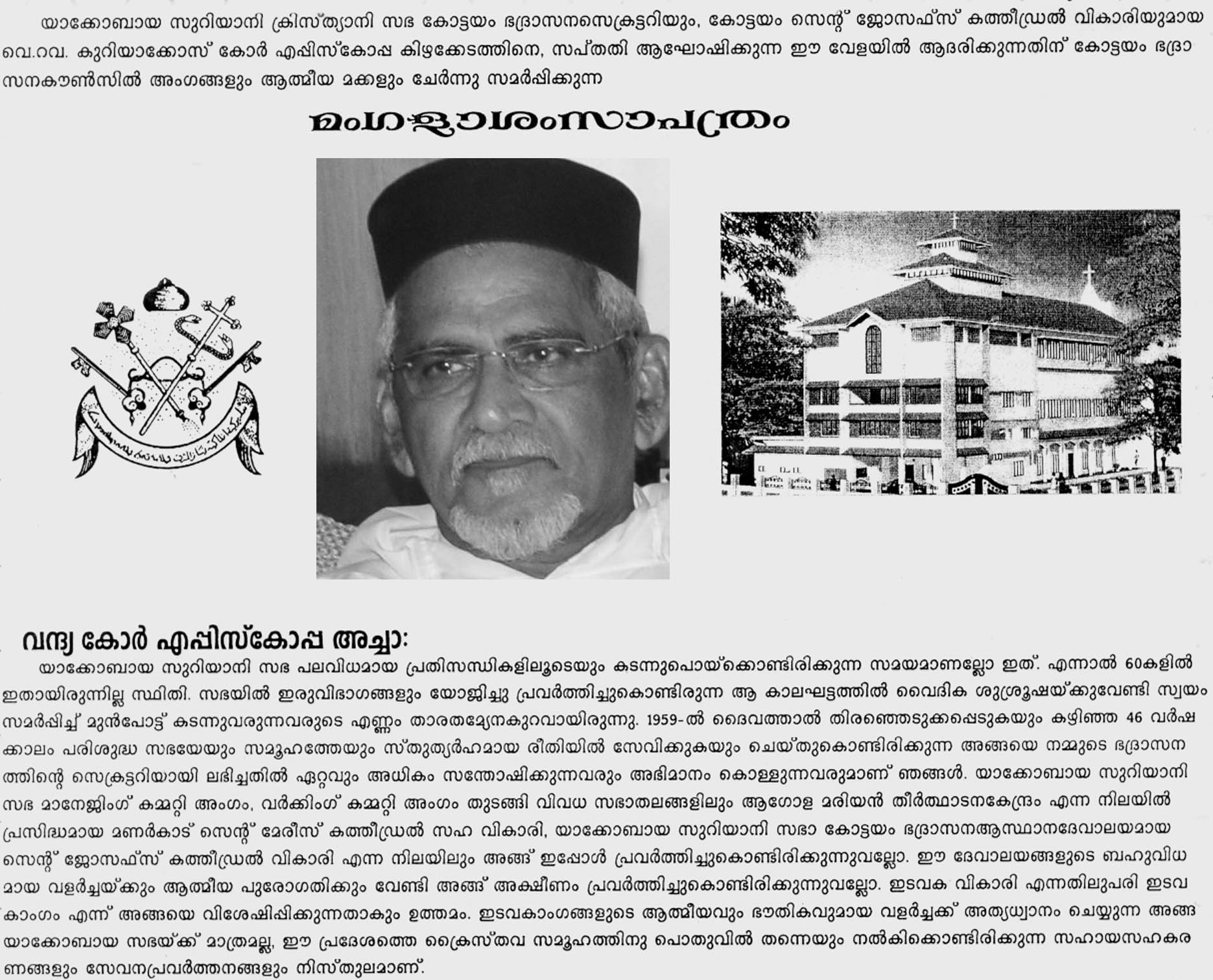 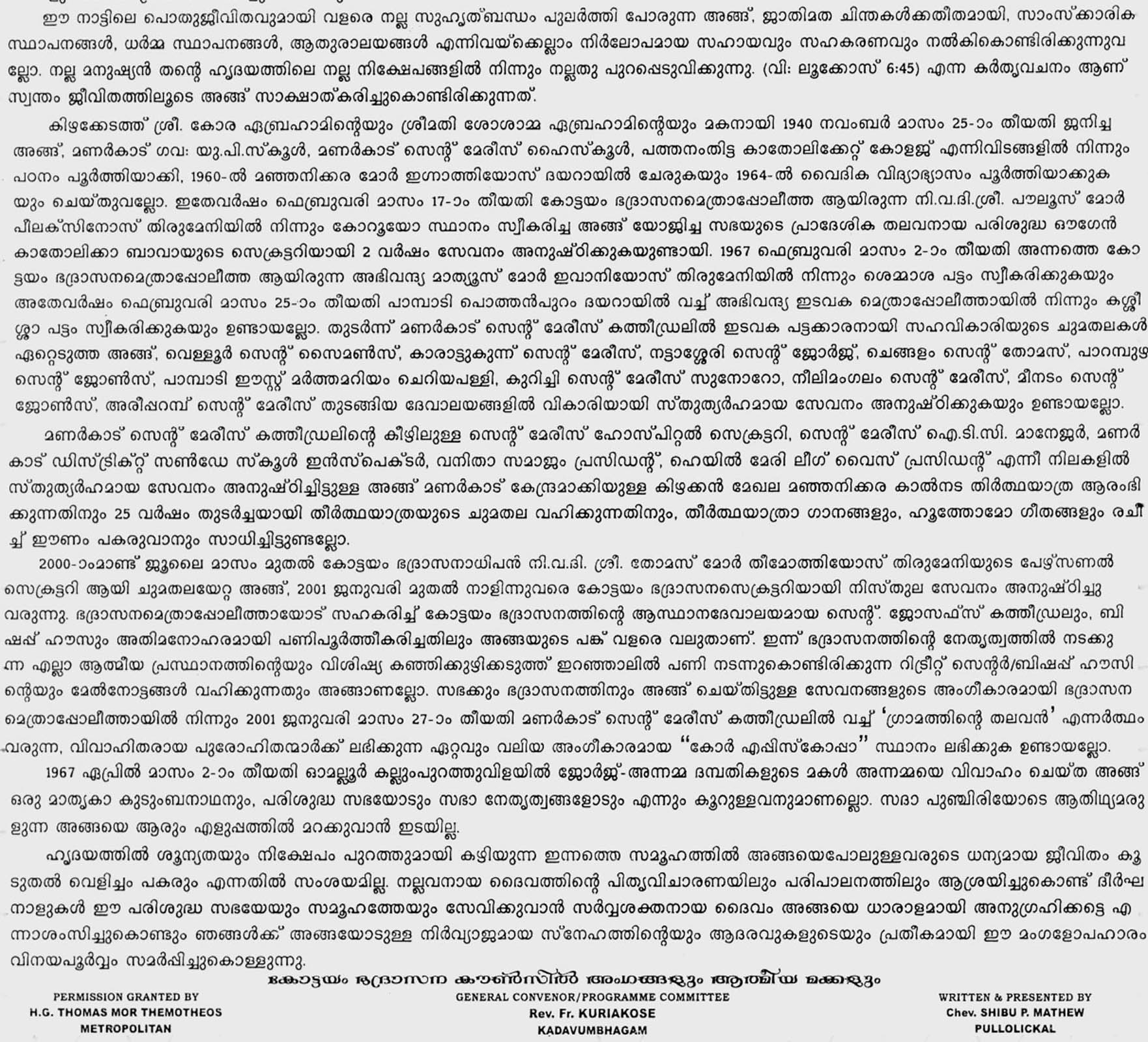
|
||
|
The Beautiful Hands of a Priest
 We need them in life's early morning,
We need them in life's early morning, We need them again at its close; We feel their warm clasp of true friendship, We seek them when tasting life's woes.
At the altar each day we behold them,
And when we are tempted and wander,
And when we are taking life's partner,
God bless them and keep them all holy,
When the hour of death comes upon us, |
||
|
by John R. Throop Scripture: 2 Chronicles 24:1–25
Think about how other people have influenced your life. One couple I know, Brett and Kayla, were profoundly influenced by others. Brett had played multiple sports in high school and enjoyed a wonderful mentoring relationship with one of his coaches. But after he started playing sports in college, he found that it wasn't the game he cared about as much as it was his former coach, and he ended up dropping out of athletics. Similarly, Kayla became active in her church's women's ministries because of the great lessons she had learned from the women's leader in her previous church. Influence is powerful. We often want to emulate good leaders and follow their examples. The high priest Jehoiada was a great influence on little King Joash, who was only seven years old when he became king. Joash needed some help ruling the kingdom, and Jehoiada stepped up as his helper and adviser. He chose two wives for Joash and helped Joash restore the temple in Jerusalem and resume worship of the Lord there. Joash was heavily influenced by others - first by Jehoiada, who led him in the ways of God, and then, after Jehoiada died, by the officials of Judah, who abandoned God and worshiped other gods. When Jehoiada's son Zechariah spoke out against idol worship, warning the king and his people that God would forsake them because they had forsaken God, Joash and his leaders had Zechariah stoned to death. Like Joash, we have people who have had a major impact on our lives, and we feel lost when they are no longer with us. We may even think that we need others to step in to fill that gap. But like Joash, depending too much on others can prevent us from learning to make critical decisions in our lives. The best role of a parent, mentor, teacher or pastor is that of helping others to learn how to think for themselves. If Jehoiada had taught Joash to think for himself, the story of this king might have had a different ending. Instead of being led by others, Joash might have been a strong, decisive king who set before the people a lifelong pattern of trusting God for guidance and direction. My friends James and Elaine relied on the leadership and guidance of key people until they were in a couples' group at church. The rule in that group was that everyone was expected to think about and discuss key issues and situations. The group then asked everyone to take one more step: Each couple was expected to reach their own conclusion on an issue, based on Scriptural guidelines, and explain to the group how they had come to that decision. Learning and practicing that kind of decision making changed their marriage forever as James and Elaine learned how to think for themselves. Reaching their own conclusions on various issues became a lifelong pattern of learning God's lessons without leaning on others to do it for them. Let's Talk Who has greatly influenced our lives? Did they teach us mostly what to think or how to think? Describe their approaches. How are leaders or role models helpful for us? How can they be negative influences? How can we turn negative influences into positive results? What are some good ways for us to blend the positive influences of others into our lives? How can their lessons shape our faith and our values? Source: NIV Devotions for Couples |
||
|
With over 6000 articles and hundreds of
links to outside resources covering all aspects
of Syriac Orthodoxy that are of interest to Family, Malankara World is the
premier source for information for Malankara Diaspora. In addition to articles on
spirituality, faith, sacraments, sermons, devotionals, etc., Malankara World also
has many general interest articles, health tips, Food and Cooking, Virtual Travel,
and Family Specific articles. Please visit
Malankara World by clicking here or cut and paste the link on your browser:
http://www.MalankaraWorld.com/Library/default.htm
Malankara World Journal Subscription If you are not receiving Malankara World Journal directly, you may sign up to receive it via email free of cost. Please click here: http://www.MalankaraWorld.com/Library/Register/news_regn.asp You can contact us via email at mail@malankaraworld.com Malankara World Journal Archives Previous Issues of Malankara World Journal can be read from the archives here. You can contact us via email at mail@malankaraworld.com Thank you for your help and support. Malankara World Team |
||
|
Malankara World Journal is published by MalankaraWorld.com
http://www.MalankaraWorld.com/
Copyright © 2011-2019 Malankara World. All Rights Reserved. |
